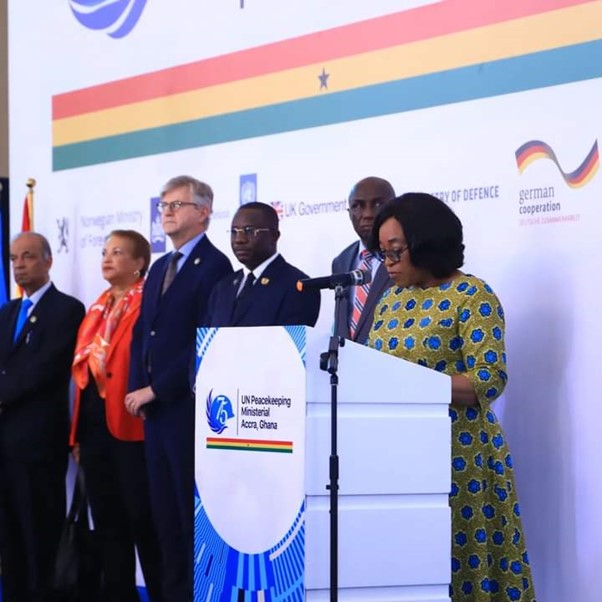The Minister for Foreign Affairs and Regional Integration, Shirley Ayorkor Botchwey, has urged all member-states participating in the 2023 UN (United Nations) Peacekeeping Ministerial to convert the knowledge and insights that will be shared at the meeting into tangible actions.
Delivering a speech during the ministerial meeting’s first day, she emphasised that current security challenges facing the globe demand sustained commitment and collaboration; hence, implementing knowledge acquired at the meeting “will contribute to global peace and security”.
“I urge each participant to translate the insights gained and commitments made during our time together here into tangible actions that will contribute to global peace and security,” she encouraged.
The flagship event, co-hosted by the United Nations and the Republic of Ghana, marks the fifth of such meetings at the ministerial-level and is the first to be held on the African continent.
She further highlighted that the UN Peacekeeping Ministerial is a “platform for the exchange of innovative approaches, best practices and lessons learned in the field of peacekeeping” – adding that the in-depth knowledge shared by participating nations will deepen the globe’s collective understanding, and also provide a solid foundation for “developing comprehensive strategies to address contemporary peacekeeping and security challenges”.
Ms. Botchwey noted that she hopes the event will be marked “by a rich tapestry of ideas, perspectives and collaborative efforts”, as well as a continuous collective commitment by all member-states to strengthen UN peacekeeping operations.
She is expectant that the depth of discussions, diversity of viewpoints and pledges made at the meeting will be underpinned by the strength that arise from the world’s unity in addressing multifaceted challenges which define our global landscape today.
The minister called on all participating nations to explore some of Accra’s historic sites – such as the iconic Black Star Square and Kwame Nkrumah Memorial Park and Mausoleum among others.
Commenting on the choice of venue for this year’s UN peacekeeping ministerial meeting, the United Nations Under-Secretary-General for Peace Operations, Jean-Pierre Lacroix, said it is fitting to hold the meeting in Accra because Africa is a continent where the majority of peacekeeping operations take place – and Ghana as a country is one of the most important troops and police-contributing countries, and certainly one of the biggest troops and police-contributing countries in Africa.
Mr. Lacroix in his remarks commended the country for hosting the meeting, and outlined political recommitment to peacekeeping, opportunity to celebrate the achievements of peacekeepers and knowing the pledges of member-states as the three main reasons for the meeting.
He explained that the political recommitment of nations is critical to peacekeeping, because the UN as a whole is operating against the backdrop of a more divided world and a more divided international community – adding the presence of all member-states in Accra “is a reflection of that strong commitment”.
Mr. Lacroix underscored the ministerial meeting as a platform to celebrate the achievements of peacekeepers, noting that it is important since they risk their lives every single day to protect the lives of hundreds and thousands of civilians.
He also emphasised the individual contributions of member-states and their security agencies in providing training, technology and partnerships.
“There’s nothing we can do without the contribution of our member-states, without the men and women, the units, the individual police and military officers, the support that all of us can provide in terms of training, technology and partnerships,” he emphasised.










